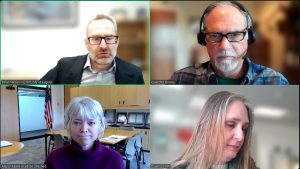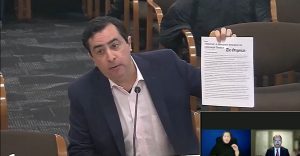Lane County Emergency Management launches podcast
5 min read
Here’s a sample from Lane County’s new podcast, titled, When It Hits The Fan. Why a podcast?
Devon Ashbridge (Lane County, public information officer): We’ve been looking for ways to help our community become more prepared for disaster. We have had multiple federally declared disasters. We’ve had fires and ice storms and flooding, and it is something that our community faces on a more regular basis than in previous generations. And so, you know, our goal is to provide another avenue for people to get that preparedness information and hopefully engage both in their individual preparedness at home and understanding what response and emergency management looks like.
[00:00:51] Tiffany Brown (Lane County, emergency manager): Frankly, the job I do is really not well understood, and I think that’s partly because it varies so greatly in terms of what I’m doing on a day-to-day basis, or even the role of my agency during a disaster.
[00:01:06] Let’s start with emergency response. We all know what that is. It’s what we see every day: It’s Police and Fire and Public Works and Public Health, doing the things that they do every day and it generally works really well. When their resources are taxed, they have mutual aid agreements and they rely on one another. And that system tends to work very well.
[00:01:29] Where I come into play is when the everyday resources just aren’t enough; when a jurisdiction has something in front of them and all of their resources don’t meet the needs and they have gaps. Sometimes that looks like extra resources that we coordinate; sometimes it looks like advance planning; and often it looks like community engagement, evacuation, or alerting the public.
[00:01:58] So, when I talk about us or we or emergency management or the emergency operations center, that’s also not just me or my very small staff day to day, which is one to two people. When we are in response mode as emergency management, that means we’ve activated the Emergency Operations Center.
[00:02:20] And when that happens, my operations expand. They include you, Devon, the public information officer, a critical piece in county response; Search and Rescue from the Sheriff’s Office; the EOC staff, which can be just county staff that has a day job. And when we activate the Emergency Operations Center, they come over and help us. We have subject matter experts, depending on the event, you don’t know who’s going to be in the Emergency Operations Center, but that’s generally how it works.
[00:02:53] And we actually have a new person coming on to assist with this, is exercise and training. And that is ‘training like we’ll fight,‘ practicing the things that we know we’ll be activating and providing and engaging and coordinating with agencies during an event. So, the best way to ensure that we do that well when the time comes is to practice ahead of time. Training and exercise is a big part of what we do.
[00:03:22] Devon Ashbridge (Lane County, public information officer): Yeah, it’s been really great as the program has grown to see more opportunities here for our staff and our partner staff locally to receive training. It makes a huge difference when you walk into that room on a really bad day and everybody’s using the same words and has the same understanding of what we’re there to do. It sounds so basic, but it really makes just an incredible difference.
[00:03:50] Tiffany Brown (Lane County, emergency manager): It really does. It can be an incredibly stressful environment when everything’s working as it should.
[00:03:56] So let me take a step back and talk about what we’re doing during the regular days, the everyday days when things are working as they should, and to talk about that, it’s helpful to talk about the phases of emergency management, which are: Preparedness, Mitigation, Response, and Recovery. And everything we do fits into one of those buckets.
[00:04:27] Devon Ashbridge (Lane County, public information officer): I feel like most people can picture ‘Response,’ but ‘Recovery’ for me is just harder sort of to wrap my head around.
[00:04:34] Tiffany Brown (Lane County, emergency manager): I get it. I don’t think you’re alone. Response is something that we see every day, and it’s a word we’re familiar with.
[00:04:41] The definition of ‘recovery’ is ‘restoring the affected area to its previous state.’ And that can mean so many different things: Restoring businesses, returning people to their homes, and starting to restore everything that’s out of whack because of the event.
[00:05:01] But therein lies the complexity. Everyone’s different. We have a goal to address the whole community, meet the needs of everyone, meet them where they’re at, address the realities of everyone’s different lived experience, different needs. And so that ends up being a really long process.
[00:05:28] Devon Ashbridge (Lane County, public information officer): So what is your favorite resource for community members? If somebody really wants to get started at their home level learning a little bit more about preparedness, where would you send them?
[00:05:43] Tiffany Brown (Lane County, emergency manager): I usually start by recommending the FEMA website. It’s easy to remember: ready.gov. It comes in additional languages and it really covers everything pretty comprehensively to consider in emergency management.
[00:05:59] Devon Ashbridge (Lane County, public information officer): We will put some of the resources you talked about today in the show notes for people to make it easy for them to find. Until next time!
[00:06:09] John Q: That’s just a sample of what you’ll hear on the new emergency management podcast, When It Hits The Fan, with Devon Ashbridge and Tiffany Brown. You can hear the complete show at LaneCountyOR.gov/FAN.
[00:06:21] Each show is accompanied by a list of resources, such as this week’s links to Lane Alerts and Ready.gov. Residents on the coast, the rivers and the forests, prepare for the most likely events in each locality. Ask your neighbors how they prepare, and share preparedness information with others, at your local community organization.






